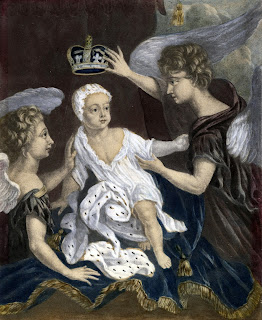John Dryden and the first Jacobite poem
Britannia Rediviva -A Poem on the Prince
Born 10th June 1688
Birth of the infant Prince James in 1688, unknown artist, image in public domain courtesy of 'Wikipedia'
The Jacobites have been commemorated in song, ballads, novels. But arguable the first Jacobite poem -John Dryden's Britannia Rediviva, A Poem on the Prince - has been overlooked.
Charles II died on 6th February 1685. The ongoing struggle for succession between the Protestant Duke of Monmouth, his illegitimate son, and Charles' brother James Duke of York, a Roman Catholic, was destined to break out again due to the stubborn nature of both men. Neither seemed prepared to abandon their claim to the succession. However, Monmouth was in exile in the Dutch Republic. The fact that the Duke of York took his throne with so little opposition probably should have been a warning but Monmouth launched his rebellion by landing at Lyme Regis on 11th June 1685, yet,only really managed to gain support in parts of East Devon, Somerset and the very Western edge of Dorset. The Battle of Sedgemoor, the last pitched battle on English soil, saw Monmouth soundly defeated. An uprising in Scotland under the Duke of Argyll to coincide with the Monmouth Rebellion faltered even more swiftly.
Somehow the vast majority of the population were prepared to tolerate a Catholic king. The reasons were most likely that James was considered at the age of 52 to be old by the time he ascended the throne. Moreover , James and his second wife, Mary of Modena,whom he married in 1677, seemed to have problems conceiving a child who could survive . Mary of Modena may have had as many as seven miscarriages whilst three babies died in infancy. * By 1685, the couple were childless and considered unlikely to be in a position to have a healthy child, particularly a son, who would be the heir apparent.
Moreover James' daughters, Anne and Mary from his first marriage , were both Protestant and had married princes of their faith. It is highly likely that James' reign could just be viewed in Protestant terms of reference as something that would pass, some sort of spiritual test that the faithful had to go through until the Protestant succession would return. However, on 10th June 1688 Mary of Modena gave birth to a healthy son also named James. The possibility of a Catholic dynasty, perhaps a full on Catholic resurgence, suddenly loomed. In November William of Orange landed at Torbay with a Dutch army, and James lost the throne in a matter of weeks . Mary of Modena took the baby James into exile on 9th December 1688.
John Dryden was a firm supporter of James in his Duke of York of days. He was re-appointed as Poet Laureate by James. Dryden had also converted to Catholicism around the Summer of 1685 . Britannia Rediviva was licensed for publication on the 19th June 1688. It is not great literature. Dryden seemed to be trying too hard to prove his loyalty to the Crown, and to his new faith. The poem becomes more of a curiosity due to its misplaced, perhaps desperate, optimism in a new Catholic dynasty which was never going to happen.
Britannia Rediviva (extract )
| Our vows are heard betimes! and Heaven takes care To grant, before we can conclude the pray'r: Preventing angels met it half the way, And sent us back to praise, who came to pray. Just on the day, when the high-mounted sun Departing Spring could only stay to shed Last solemn Sabbath saw the Church attend; Or did the mighty Trinity conspire, Hail, son of pray'rs, by holy violence |
It's hard to think of another royal birth which caused so much havoc. The reign of James as King James II of England, James VII of Scotland, lasted less than four years. His son James spent most of this life in exile, first at St Germaine, then Rome. His attempt to take the throne in 1715 failed, and has gone down in history as the 'Old Pretender' , dying uncrowned and in exile on 1st January 1766. Overshadowed in history by dramatic arrival in Scotland of his son Bonnie Prince Charlie in 1745, and its sad end at the Battle of Culloden on 16th April 1645. The Protestant Whig ascendancy took massive retaliation against the Highlands.
Footnote.
* Historians differ concerning how many miscarriages and how many children the couple who had, only to die in infancy. I have used Rebecca Starr Brown blogpost on the subject.
More posts about John Dryden from this blog
Rose Alley Ambuscade Post about the physical assault that took place on Dryden on 18th December 1679
John Dryden and Restoration War Poetry From 2017, looking at Dryden's poetry on the second Anglo-Dutch War 1665-1667.
New Blog
Have been gathering some of my previous post about the Duke of Monmouth and the Monmouth Rebellion and re posting them in a new blog Monmouth Rebellion 1685



Comments
Post a Comment